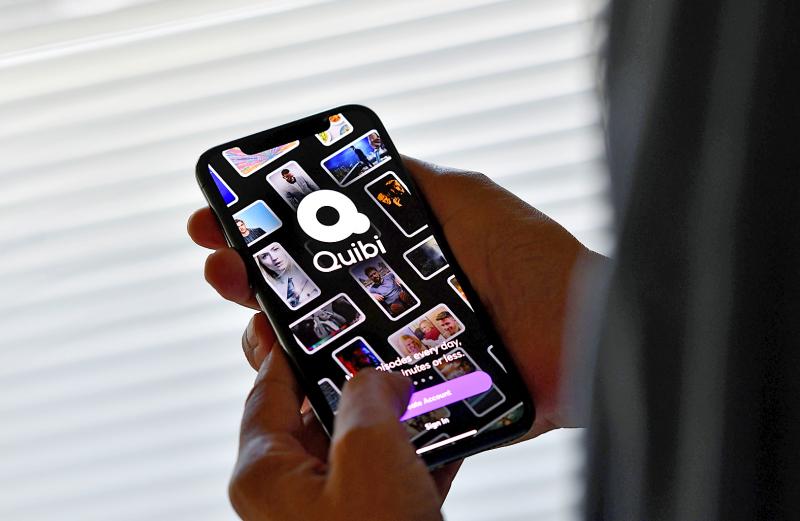Short-form streaming service Quibi Holdings LLC on Wednesday announced that it was pulling the plug on the platform aimed at smartphone users hungry for entertainment on the go.
The brainchild of Hollywood powerhouse Jeffrey Katzenberg, Quibi launched in April with content tailored for busy people just as the pandemic compelled them to slow down and stay in.
“Quibi was founded to create the next generation of storytelling,” Katzenberg said in a release. “The world has changed dramatically since Quibi launched and our standalone business model is no longer viable.”

Photo: AFP
Katzenberg reportedly tried to sell the start-up’s catalogue of programs to companies including NBCUniversal Media LLC and Facebook Inc without success.
The streaming service has more than 100 original series spanning a range of genres, with episodes specifically designed for viewing on smartphones and lasting no more than 10 minutes, it said.
“We have assembled a world-class creative and engineering team that has created an original platform fueled by groundbreaking technology and IP, enabling consumers to view premium content in a whole new way,” Katzenberg said.
Quibi plans to wind down operations and sell off its assets. It had hoped to keep users coming back with daily news, sports and entertainment shows.
“Quibi was a big idea and there was no one who wanted to make a success of it more than we did,” Katzenberg and Quibi CEO Meg Whitman said in a letter to its employees posted on Medium.
“Our failure was not for lack of trying; we’ve considered and exhausted every option available to us,” the letter said.

SEMICONDUCTORS: The German laser and plasma generator company will expand its local services as its specialized offerings support Taiwan’s semiconductor industries Trumpf SE + Co KG, a global leader in supplying laser technology and plasma generators used in chip production, is expanding its investments in Taiwan in an effort to deeply integrate into the global semiconductor supply chain in the pursuit of growth. The company, headquartered in Ditzingen, Germany, has invested significantly in a newly inaugurated regional technical center for plasma generators in Taoyuan, its latest expansion in Taiwan after being engaged in various industries for more than 25 years. The center, the first of its kind Trumpf built outside Germany, aims to serve customers from Taiwan, Japan, Southeast Asia and South Korea,

Gasoline and diesel prices at domestic fuel stations are to fall NT$0.2 per liter this week, down for a second consecutive week, CPC Corp, Taiwan (台灣中油) and Formosa Petrochemical Corp (台塑石化) announced yesterday. Effective today, gasoline prices at CPC and Formosa stations are to drop to NT$26.4, NT$27.9 and NT$29.9 per liter for 92, 95 and 98-octane unleaded gasoline respectively, the companies said in separate statements. The price of premium diesel is to fall to NT$24.8 per liter at CPC stations and NT$24.6 at Formosa pumps, they said. The price adjustments came even as international crude oil prices rose last week, as traders

SIZE MATTERS: TSMC started phasing out 8-inch wafer production last year, while Samsung is more aggressively retiring 8-inch capacity, TrendForce said Chipmakers are expected to raise prices of 8-inch wafers by up to 20 percent this year on concern over supply constraints as major contract chipmakers Taiwan Semiconductor Manufacturing Co (TSMC, 台積電) and Samsung Electronics Co gradually retire less advanced wafer capacity, TrendForce Corp (集邦科技) said yesterday. It is the first significant across-the-board price hike since a global semiconductor correction in 2023, the Taipei-based market researcher said in a report. Global 8-inch wafer capacity slid 0.3 percent year-on-year last year, although 8-inch wafer prices still hovered at relatively stable levels throughout the year, TrendForce said. The downward trend is expected to continue this year,

Taiwan Semiconductor Manufacturing Co (TSMC, 台積電), which supplies advanced chips to Nvidia Corp and Apple Inc, yesterday reported NT$1.046 trillion (US$33.1 billion) in revenue for last quarter, driven by constantly strong demand for artificial intelligence (AI) chips, falling in the upper end of its forecast. Based on TSMC’s financial guidance, revenue would expand about 22 percent sequentially to the range from US$32.2 billion to US$33.4 billion during the final quarter of 2024, it told investors in October last year. Last year in total, revenue jumped 31.61 percent to NT$3.81 trillion, compared with NT$2.89 trillion generated in the year before, according to